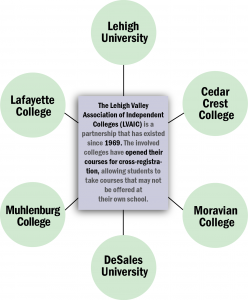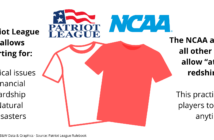
Designed by Kelly McCoy
Lehigh, along with five other schools in the Lehigh Valley, has been part of an organization called the Lehigh Valley Association of Independent Colleges since 1969. This partnership allows students to take classes at any of the member schools if the school where they are enrolled does not offer that class.
Lehigh, along with Moravian College, Cedar Crest College, DeSales University, Muhlenberg College and Lafayette College, essentially outsource classes so their students can take any necessary or desired courses for their majors or future careers.
For example, DeSales offers Italian language courses, but Lehigh does not. A Lehigh student has the opportunity to register with the Lehigh Valley Association of Independent Colleges and take DeSales’ Italian class while still being a full-time Lehigh student.
This works through a process called cross-registration, in which students can sign up to take a class at another school and the grade, credits and cost transfer over to the student’s record. The course credit is counted as part of the student’s total for the semester.
There is no additional cost associated with the class besides textbooks or extra materials the professor may require.
The goal is to provide as comprehensive an education as possible for the students in the Lehigh Valley. By allowing students to take classes at another university, those students are able to have a learning experience that is not limited by the courses one individual university does or does not offer.
“What we really look for is to expand opportunities for students,” said Diane Dimitroff, the executive director of the Lehigh Valley Association of Independent Colleges and secretary of the board of directors.
Most classes take place at the school that offers them, although some classes are conducted through video chat. There is no transportation provided for classes at another school.
Erika Bettermann, a Lehigh alumna who used the Lehigh Valley Association of Independent Colleges program to take a principles of nutrition class at Cedar Crest College, was thankful she could take a class Lehigh did not offer.
“I was able to take the course under Lehigh tuition,” Bettermann said. “I didn’t have to pay any extra money, and it was pretty easy to get to.”
The program allows schools in the Lehigh Valley to formally interact with each other on an institutional level as well as a student level.
The governing body of the Lehigh Valley Association of Independent Colleges is a board of directors consisting mainly of the presidents of the six member schools. Bernard O’Connor, the president of DeSales University and the chair of the Lehigh Valley Association’s board of directors, said the colleges often interact with each other and share resources.
Through this program, students have the opportunity to explore another college setting and learn in a different environment. Students can become familiar with other Lehigh Valley students and thereby reduce the sense of division among them.
“The partnership was amazing because I could take classes that I wouldn’t be able to take otherwise,” Bettermann said. “I got everything out of it that I could have hoped for.”
To qualify for registration, a student must be enrolled as a full-time undergraduate student at his or her college and have achieved sophomore status. Eligible students are permitted to register for up to two undergraduate courses per semester or summer session at another university.
Almost any class can work with the program. Dimitroff said this does not apply, however, to certain courses such as independent study, tutorials, private music lessons, online courses and field experience, among other specific cases.
To enroll, a student must first obtain permission from the Lehigh Valley Association of Independent Colleges advisers at both his or her home school and the intended host school. Once permission is granted, the student’s grades and transcripts can be sent over to the host school and the student can sign up for classes. When the semester starts, the students attend classes at the host school as they would a regular class.





Comment policy
Comments posted to The Brown and White website are reviewed by a moderator before being approved. Incendiary speech or harassing language, including comments targeted at individuals, may be deemed unacceptable and not published. Spam and other soliciting will also be declined.
The Brown and White also reserves the right to not publish entirely anonymous comments.